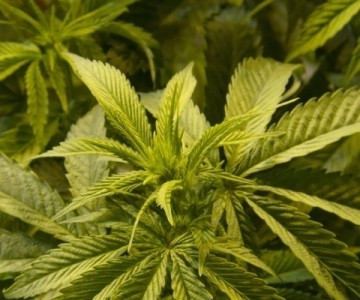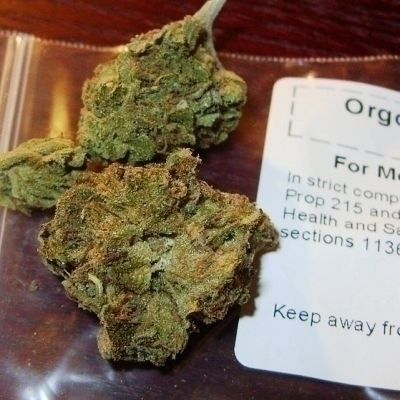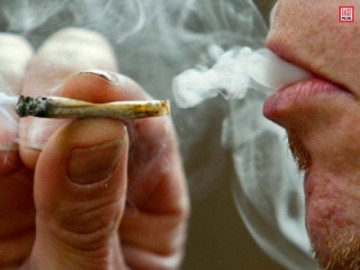Will Rhode Island Be The Next State To Legalize Marijuana?
Wednesday, January 15, 2014
Rhode Island could potentially be one of the next states to legalize marijuana, although big hurdles do remain.
With recreational use legal in Washington and Colorado, a spokesperson for the drug law reform group Marijuana Policy Project tallies a dozen states where legalization could become reality.
“Given the level of support we've seen among residents and lawmakers, it could very well be Rhode Island,” says that group's spokesperson Mason Tvert.
GET THE LATEST BREAKING NEWS HERE -- SIGN UP FOR GOLOCAL FREE DAILY EBLASTBut whether legislation to tax and regulate the drug comes up for a vote in the General Assembly remains to be seen.
Mixed signals whether state bill moves in 2014
“We have gained momentum every year. Each year more of my colleagues have told me they're eager to sign on as a co-sponsor,” said Rep. Edith Ajello, the House sponsor of the Marijuana Regulation, Control, and Taxation Act.
Introduced for the past three years and expected to be reintroduced later this month, the bill received testimony in committee in 2013 but was not taken up for a vote.
While receiving additional support, there's question whether the legislation sees any further action this time around after Gov. Lincoln Chafee and Senate President M. Teresa Paiva Weed have both cast doubts on its chances in 2014.
National debate focusing on key states through 2016
The path toward legalization varies from state to state along two options: legislation or public referendum.
“In 2014, Alaska and Oregon look to be next for citizen voter initiatives,” said Allen St. Pierre, executive director of the National Organization for the Reform of Marijuana Laws (NORML). In addition to California, “those will make up the best chances,” St. Pierre said.
In terms of legislative action, the head of NORML said Rhode Island would be one of the states to push legalization legislation the furthest. “Rhode Island has a unique history unlike any other, in that it's the only state that has overridden governors' vetoes,” he said. “(Gov. Chafee) could find himself in the same situation.”
“Rhode Island and Maine represent the best opportunities in the nation to legislatively pass marijuana legalization.” And if he was a betting man, St. Pierre said his money would be on the Ocean State.
Lobbying for ballot initiatives and legislation
“Our organization has made it clear we're going to support ballot initiatives and lobbying in state legislatures,” Tvert said, tallying possible ballot measures in Massachusetts, Maine, Arizona, California, Nevada, and Montana, most in 2016 during the next presidential cycle.
Meanwhile, there's some momentum for state lawmakers to pass legislation in Rhode Island, Maryland, Delaware, New Hampshire, Vermont, and Hawaii.
While Rhode Island's “tax and regulate” bill has stalled each successive year, “we're certainly working to get the measure passed,” Tvert said.
An alliance of support has formed in the state as the Coalition for Marijuana Regulation.
Speaking to GoLocal last month on the issue, state Sen. Josh Miller, a co-sponsor last year expected to introduce the bill this session, said the change would create revenue while also controlling access better than under a criminal system.
Marijuana sales in Colorado topped $1 million on New Years Day, the first day dispensaries were allowed to operate.
“There's always a revenue component,” Miller said, continuing on to say a portion of revenues would respond to drug abuse in Rhode Island. One provision of the bill designates 40 percent of revenue raised from sales would go to fund programs for alcohol and drug abuse treatment. “That's important,” Miller said.
“Prohibition hasn't worked,” contends Ajello, chair of the House Judiciary Committee, who points to easier access currently among youth to marijuana than alcohol. “I am concerned about young people.”
By regulating the sale and providing a legal avenue for purchase, illicit sales will not be so profitable, Ajello said. “Minors' access to marijuana should go down substantially. That's a big part of it.”
“And because there's so much responsible use by adults, apparently, it makes sense to tax and regulate it,” she added.
Public opinion moving toward support
A January 2012 Public Policy Polling survey found 52 percent of respondents in the state supported treating marijuana like alcohol, taxed and regulated and legal for adults 21 and older.
“One of the ways to see public understanding is to introduce a bill and have a discussion,” according to Miller.
Rhode Island's legislation would remove state-level criminal penalties for the private possession by adults of up to one ounce of marijuana, and allow for the private growing of up to three mature plants in an enclosed, locked space.
The bill would also establish a system of licensed retail stores and cultivation facilities regulated under the Department of Business Regulation. An excise tax of up to $50 per ounce on the wholesale sale of marijuana would be applied at the point of transfer before retail, and retailers would be required to collect the state's 7 percent sales tax.
Too soon in Rhode Island?
Last week, Chafee told the Associated Press it was premature to be considering legalization in Rhode Island, where the state's decriminalization measure went into effect early last year. He told reporters that the impact of last year's change would need to be better understood before the state follows with legalization.
Located in Denver, Tvert sees significant and growing support for the change across the nation, including bipartisan support in Rhode Island by way of House Republican Minority Leader Brian Newberry's cosponsorship last year.
“Colorado and Washington are demonstrating to the other states that regulating marijuana is possible and we believe it will be a fair and effective alternative to prohibition,” Tvert said.
While often compared to the taxation and regulation of alcohol, Tvert said the public health costs and consequences of that substance were far greater.
“If we're truly interested (in public health) we should be allowing adults to choose the less harmful substance,” he continued. “Marijuana has been used for a long time, and it's not going anywhere. It's time to get our heads out of the sand.”
Related Slideshow: Marijuana Use in the New England States
According to data collected by the Substance Abuse & Mental Health Services Administration, New Englanders are among the nation's top marijuana users in the country. See how the indivdual states compare in the slides below:
Related Articles
- NEW: Bill Would Legalize Marijuana in Rhode Island
- Will Rhode Island Legalize Marijuana?
- RI’s Own Miss Universe Olivia Culpo Advocates for Medical Marijuana
- NEW: Medical Marijuana ‘Consultancy’ Shut Down By Dept. of Health
- PODCAST: The Highest Marijuana Prices in New England by State
- State Report: Strippers, Marijuana Dispensaries & Legislive Payraises
- NEW: Patrick Kennedy Opposed to Legalization of Marijuana
- RI State Report: Is It High Time to Legalize Marijuana?
- NEW: Brown, URI Named Top 10 Colleges for Marijuana Activism
- NEW: Marijuana Arrest Rates Racially Disparate Toward Blacks
- The Highest Marijuana Prices in New England by State
- Leonardo Angiulo: MA Court Takes Hit of Justice in Marijuana Rulings
- Newport Manners + Etiquette: Marijuana Manners
- The Scoop - Whitehouse Talks State and Federal Marijuana Laws
- In Case You Missed It: Highest Marijuana Prices in New England
- New England States With The Highest Marijuana Arrest Rates
- RI Dept. of Health Approves First Medical Marijuana Dispensary
- State Report: Medical Marijuana, RI’s Business Ranking & Obama Supports Cicilline
- Breaking and Entering Doc Holding Marijuana Suspended by RI HEALTH
- New Gallup Poll Shows 38% of Americans Have Tried Marijuana
- NEW: Brown to Host Debate on Marijuana Legalization on April 23
- ACLU Defends Longtime Medical Marijuana Users Against State
- RI State Report: Marijuana Decriminalization & Safer Schools
















